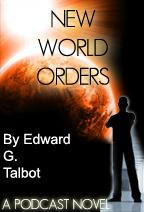SFF Audio, the blog about podcasts and other audio that is available about SciFi and Fantasy, invited me to write a couple of guest posts on their blog. This weekend, there will be the first. It will be part of their guest blogger series in which the bloggers tell about their Five Favorite podcasts.
I will write about my favorite history podcasts, which, by the way, is a shifting phenomenon. I'll give a you a different list any other day, but that is not what I wanted to get into. What I wanted to point out is that SFF audio covers intensively a field that I have just touched recently: fictional podcasts.
The main writer on SFF audio, is Jesse Willis. He was kind enough to reveal some of his favorites (five as it happens) in a guest blog over here. Thank you, Jesse!

Hi! I'm Jesse Willis, guest blogging on Anne is a Man. Today I'm going to tell you about some of the cool stuff I listen to. Sure, like Anne I listen to a lot of non-fiction podcasts. And like Anne I'm a big fan of some of the best listens out there. I'm a
Dan Carlin's Hard Core History convert. I've been listening to Professor Bob of
History According To Bob for years. But I figure you've heard the praises of these terrific shows from Anne before. So let me tell you about some similar shows, shows that will strike you as cool, but which Anne hasn't yet covered:
1.
Entitled Opinions is a podcast radio program hosted by Professor Robert Harrison. Harrison teaches in the department of French and Italian at Stanford University. He interviews guests, often other Stanford profs, about literature, history, politics, philosophy and even sports. His shows are deep, cultured and highly literate. Having been born in Turkey as the son of American diplomats, Harrison has an immense knowledge about that country, his interview with historian Aron Rodrigue is enlightening. Similar-wise, Harrision's talks with René Girard on the subject of mimetic desire are perhaps the most fascinating ever podcast. From Virgil to the Virgin Mary, from the historical Jesus to Athenian Democracy; Entitled Opinions, with its braggadocious title, earns it.
2. Two programmes by Shannon Clute and Richard Edwards have obsessed me since they first launched. (
blog)
Behind The Black Mask: Mystery Writers Revealed sits down with Crime/Mystery/Noir authors and dissects their work. Clute and Edwards approach each author's work as if it was their doctoral thesis.There has never been an interview series like this. The inteviewees often come away with a new sense of their own work. And The listener comes away with a strong desire to read the books they talk about. I'm hoping that soon they'll be able to interview Donald E. Westlake and Lawrence Block (my two favorite living crime authors). Check out their talks with Christa Faust, Seth Harwood and Charles Ardai.
Out Of The Past: Investigating Film Noir, on the other hand is an examination of films influenced by the Film Noir movement. Most DVD commentaries suck, if Clute and Edwards did film commentaries I'd buy the DVDs just to hear their shot by shot examinations. These are two highly literate Crime/Noir/Mystery fans. Check out their talks about:
Body Heat,
Kiss Me Deadly and the immortal
Pickup on South Street.
3. Professor
Courtney Brown's course at Emory University (it's archived) is a Political Science course entitled Science Fiction and Politics (Political Science 190). Brown's lectures are from two semesters of teaching this course and feature incisive political insights found in more than a dozen Science Fiction novels. Science Fiction is the most important of all modern literature because it engages the present with philosophical ideas. Let Courtney Brown illustrate just a few of the political ideas found in SF and you'll stick around for the whole course.
4.
Welcome To Mars (1947-1959), is an odd series broadcast on
Resonance FM. Creator Ken Hollings collects non-fiction oddments about the fantastic futuristic world of the fifties. This was a live-broadcast twelve-part series - kind of a one man show, with the subtitle
The fantasy of science in the early years of the American Century. Hollings: "Between 1947 and 1959, the future was written about, discussed and analyzed with such confidence that it became a tangible presence. This is a story of weird science, strange events and even stranger beliefs, set in an age when the possibilities for human development seemed almost limitless." The show is hypnotic. I'm not sure I learned as much as I unlearned, if that makes any sense.
5 Finally, here's one you'd probably never otherwise see on Anne Is A Man:
Three years into it and I'm still in love with The Red Panda Adventures! (
feed) This is an old-style radio drama (along the lines of The Green Hornet) but with modern storytelling and action. Full of kung-fu and snappy dialog you'll love it most for the wonderful characters and their dialogue. If you don't like Red Panda there's something broken in your heart!

